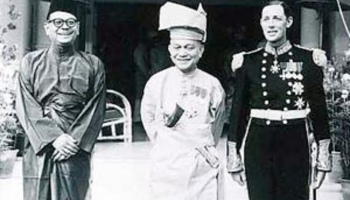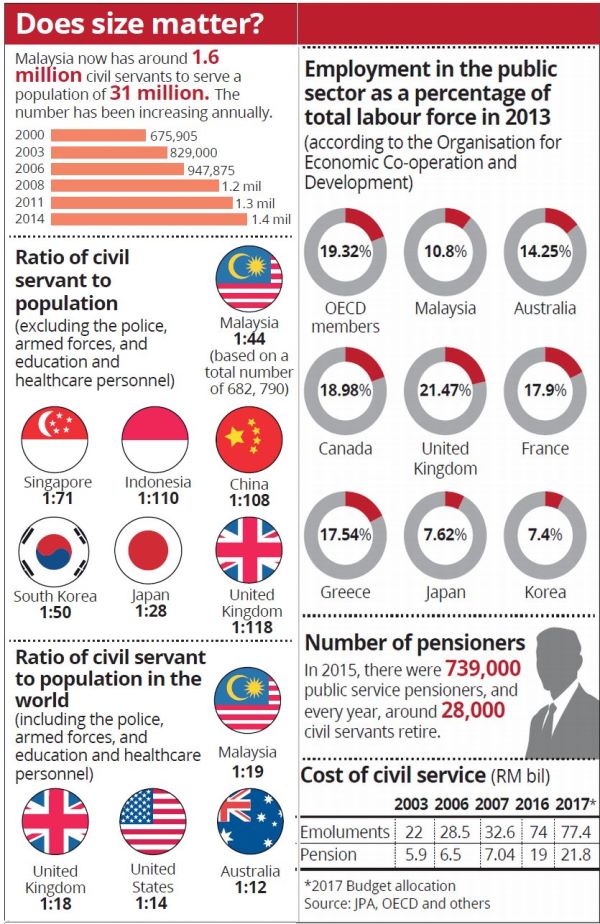It's been more than six decades since Malaysian independence, yet, more than ever, some politicians continue to wield the race and religion cards to divide us.
PATHETIC and disgusting. That’s surely an understatement in describing the continuous racist slurs non-Malays have had to endure.
Using non-Malays – particularly the Christians – as bogeymen hasn’t ended, even more than six decades after independence.
The situation has probably worsened because social media has made things more evident and amplified them. Thankfully though, politicians selling venom to their target audience can no longer be a covert affair.
These chameleons used to stir the hornet’s nest of race and religion with the Malays, portraying themselves as champions of their community. And then, they have no qualms attending events at Chinese new villages, where they try to please the residents by professing to be one people. Just to add value to the “show”, even a calligraphy writing session is entertained. Next on their “tour” – get on stage, put their palms together, and greet the people in Tamil, and then do the dance bit, of course. And we bought all that, believing they portrayed the real Malaysia.
Incredibly, some are still doing the rounds. For a fresh twist, the LBGT element has even been thrown in now, and despite the charade being recorded, clarification must be issued to say otherwise. You know, I didn’t mean it.
Someone has forgotten that it isn’t only the ghosts, drunkards and LBGT community who are still awake at 11pm and need to use the toll.
These commuters include nurses, doctors, policemen, security guards, hawkers, taxi drivers, restaurant employees, firemen, factory workers, food deliverers and of course, journalists too, and we often work the infamous graveyard shift.
Scoring points and teaming up with an equally repulsive partner to create suspicion against other fellows, with fictional threats of race and religion, is just unacceptable.
While we cringe over the thought of how there are listeners who buy their hate speech, we expect these politicians to at least rise above these nauseating tactics and convince the people that they can provide better governance and deliver more than the present government.
They should prove to the people that the new government’s failings include not fulfilling its election promises, allowing the cost of living to go up and watching the ringgit’s value shrink. And to add ammunition, highlight how some ministers have even failed their probation.
That’s what a fault-finding Opposition is supposed to do – ensure check and balance, and behave like a government in-waiting, but here we have opposition Members of Parliament who can’t wait to broker a deal by defecting to the government’s side of the fence.
There’s another distateful story. It’s about an Umno MP who crossed over to Parti Pribumi Bersatu Malaysia and had the gall to admit that he was doing it for the constituents.
So, we have an odd situation where opposition MPs mourned the defeat of the previous government even after almost a year, and now plot to join the new government. Not plot to topple, of course, not that again, but plot to join. Naturally, it’s in the interest of the people.
We believe you, well, some of us do. Most of us know it’s just a lie, but hey, we are in the era of malu apa ...
Then, there are the “remnants”, who probably won’t be accepted by the new government, and figure that the only way for them to get back on the gravy train is to stoke the fires of racial and religious sensitivity. You’ve got to give it to this lot, though. They are, at least, fighting back, although their methods are pretty despicable.
However, the hate speeches will likely work in some constituencies, where, like oil, it burns the minds and hearts of angry voters who are already struggling to put food on the table for their families.
Still, it’s the pits when someone like Barisan Nasional secretary-general Datuk Seri Nazri Aziz resorts to claiming that having a non-Muslim Attorney General is not “lawful” since he took oath without swearing on the Quran. Nazri, of course, is bluffing, but he’s like those snake oil peddlers who will say anything to make a sale.
Nowhere in the Federal Constitution does it state that an AG needs to take an oath using the Quran. And surely, we won’t expect the likes of Nazri to concede that in the history of Malaya, there were six British AGs.
Cecil Sheridan, who died aged 88 in 2000, was the last British Attorney-General of Malaya and helped in drafting the constitution of its successor state, Malaysia.
When Malaya attained independence in 1957, Sheridan was promoted to Solicitor-General and in 1959, became the country’s Attorney-General. He also helped in the preparations for the formation of Malaysia in 1963 and in the process, worked closely with Tunku Abdul Rahman, the Prime Minister of Malaya, Tun Razak Hussein, its deputy Prime Minister, and Lee Kuan Yew, of Singapore.
True, the eight subsequent successors were Malays, but there’s no race and religion criteria in the appointment of the top-ranking public prosecutor of the country.
The first Lord President of Malaysia – now renamed Chief Justice – was a Scot named Tun Sir James Thompson, who assumed the post in 1963 when Malaysia was formed. He held the post until 1966.
Likewise, after independence in 1957, Malaysia's first two finance ministers were ethnic Chinese – Tun H.S. Lee and Tun Tan Siew Sin. However, from 1974 until very recently, the post had been held by Malays.
So, what we are effectively saying is that our founding fathers had no issue with the ethnicity of these important posts such as chief judge, attorney general and finance ministers. However, as six decades have worn on, we have become more degenerate, insisting on focusing on race and religion, instead of qualifications, credibility and integrity as the main criteria?
Certainly, these men, who held the loftiest positions, did well then, and many of us can accept that they didn’t collude with individuals to loot the wealth of this country and the Malays – who make up the bulk of Malaysians.
The harsh reality is that the pilfering and corruption are shamelessly executed by those claiming to fight for their race and religion. They shouldn’t blame anyone else or try to fan the flames of racial discontent to save themselves. Malaysians are tired of such perversion, so we can’t allow such incorrigible politics to proliferate in our beloved country.
One Chinese Finance Minister, a Christian Chief Justice and an Indian Attorney-General aren’t going to be able to control a country of 31 million people, where Malays and the indigenous people make up 61.7%, compared to the the shrinking Chinese (20.8%) and Indian (6.2%) population.
As for religion, according to a 2010 estimate, Muslims number most at 61.3%, Buddhists 19.8%, Christians 9.2%, Hindus 6.3% with Confucianism, Taoism and other Chinese practices at 1.3%, others 0.4%, no religion 0.8%, unspecified 1%.
As for the 1.6 million civil servants – the then-Minister in the Prime Minister’s Department Datuk Seri Shahidan Kassim told Parliament that as at December 2014, the ethnic composition of the civil service was as follows: 78.8% Malays, Bumiputera Sabah (6.1%), Bumiputera Sarawak (4.8 %), Chinese (5.2 %), Indians (4.1 %), other Bumiputera (0.3%) and others (0.7%).
As for the police force, then-Home Minister Datuk Seri Dr Ahmad Zahid Hamidi said non-Malays only made up 5% of the 133,212-strong force.
“Of the total, 80.23% or 106,871 are Malays, while Chinese make up only 1.96% (2,615), Indians 3.16% (4,209), Punjabis 0.21% (275) and others 14.44% (19,242),” he said in replying a question by Raja Kamarul Bahrin Shah (Amanah-Kuala Terengganu).
And we haven’t even counted the Prime Minister, Deputy Prime Minister and the Malays holding key posts in the Cabinet, and of course, the overwhelmingly Malay armed forces, numbering 420,000 personnel. It’s downright contemptible for our politicians to make fictional claims of non-Malays gaining control of the country, when the facts and figures clearly speak for themselves. For most rational Malaysians, we just want to see a clean government and civil service, which can safeguard our national interest, regardless of race and religion.
The late Chinese premier Deng Xiaoping famously said that it doesn’t matter if the cat is black or white, so long as it catches the mice.
 Our recent history has showed that our big fat cats didn’t catch the mice but ended up becoming rats themselves.
Our recent history has showed that our big fat cats didn’t catch the mice but ended up becoming rats themselves.Wong Chun Wai
Wong Chun Wai began his career as a journalist in Penang, and has served The Star for over 27 years in various capacities and roles. He is now editorial and corporate affairs adviser to the group, after having served as group managing director/chief executive officer.On The Beat made its debut on Feb 23 1997 and Chun Wai has penned the column weekly without a break, except for the occasional press holiday when the paper was not published. In May 2011, a compilation of selected articles of On The Beat was published as a book and launched in conjunction with his 50th birthday. Chun Wai also comments on current issues in The Star.
Related posts:
PAS left in a state of confusion, the only way is to lie
Malaysia's Vision 2020: Falling apart with alarming speed; Dr M is creator and destroyer, said Musa
Related:





































